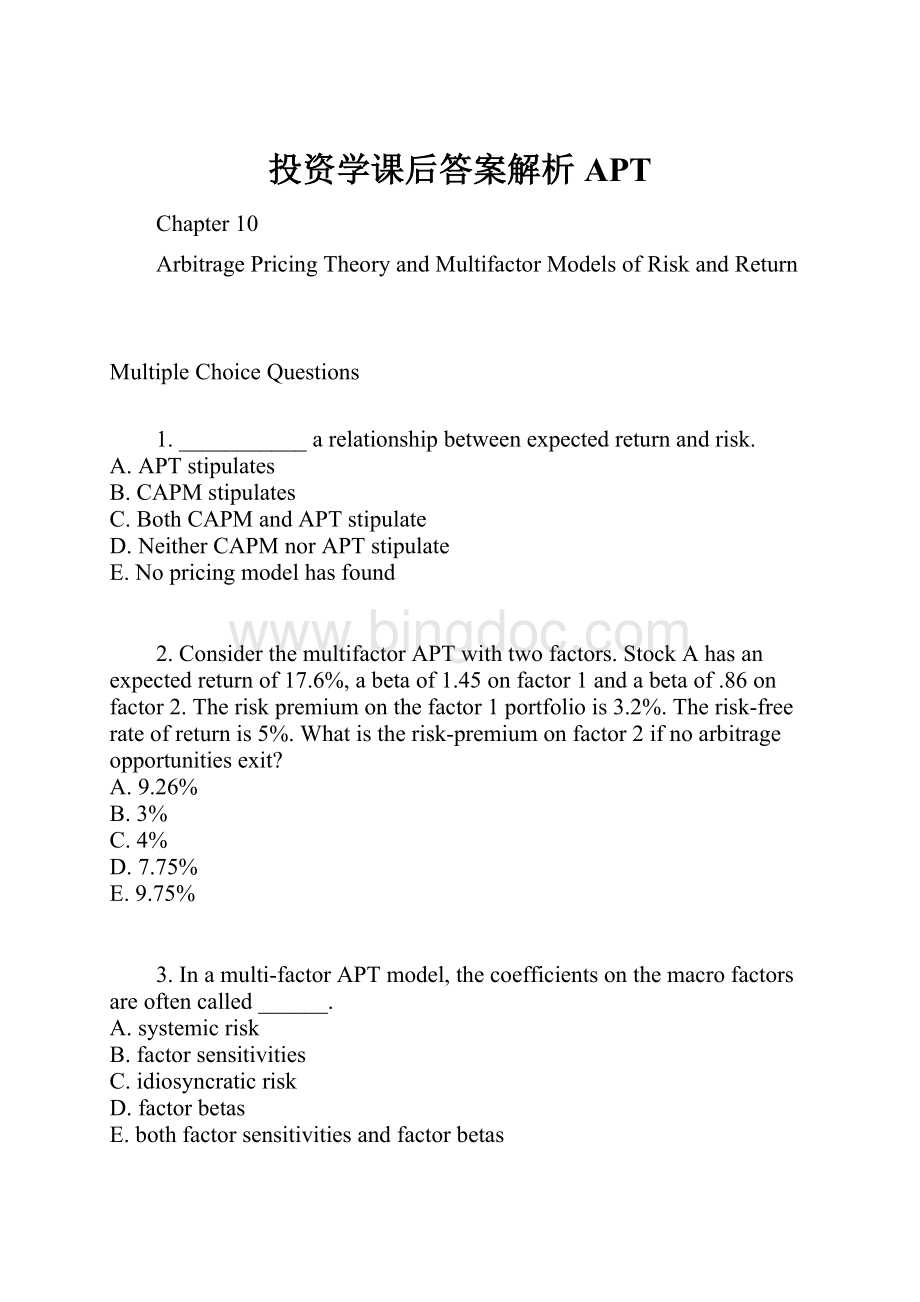投资学课后答案解析APT.docx
《投资学课后答案解析APT.docx》由会员分享,可在线阅读,更多相关《投资学课后答案解析APT.docx(67页珍藏版)》请在冰点文库上搜索。

投资学课后答案解析APT
Chapter10
ArbitragePricingTheoryandMultifactorModelsofRiskandReturn
MultipleChoiceQuestions
1. ___________arelationshipbetweenexpectedreturnandrisk.
A. APTstipulates
B. CAPMstipulates
C. BothCAPMandAPTstipulate
D. NeitherCAPMnorAPTstipulate
E. Nopricingmodelhasfound
2. ConsiderthemultifactorAPTwithtwofactors.StockAhasanexpectedreturnof17.6%,abetaof1.45onfactor1andabetaof.86onfactor2.Theriskpremiumonthefactor1portfoliois3.2%.Therisk-freerateofreturnis5%.Whatistherisk-premiumonfactor2ifnoarbitrageopportunitiesexit?
A. 9.26%
B. 3%
C. 4%
D. 7.75%
E. 9.75%
3. Inamulti-factorAPTmodel,thecoefficientsonthemacrofactorsareoftencalled______.
A. systemicrisk
B. factorsensitivities
C. idiosyncraticrisk
D. factorbetas
E. bothfactorsensitivitiesandfactorbetas
4. Inamulti-factorAPTmodel,thecoefficientsonthemacrofactorsareoftencalled______.
A. systemicrisk
B. firm-specificrisk
C. idiosyncraticrisk
D. factorbetas
E. uniquerisk
5. Inamulti-factorAPTmodel,thecoefficientsonthemacrofactorsareoftencalled______.
A. systemicrisk
B. firm-specificrisk
C. idiosyncraticrisk
D. factorloadings
E. uniquerisk
6. Whichpricingmodelprovidesnoguidanceconcerningthedeterminationoftheriskpremiumonfactorportfolios?
A. TheCAPM
B. ThemultifactorAPT
C. BoththeCAPMandthemultifactorAPT
D. NeithertheCAPMnorthemultifactorAPT
E. Nopricingmodelcurrentlyexiststhatprovidesguidanceconcerningthedeterminationoftheriskpremiumonanyportfolio
7. Anarbitrageopportunityexistsifaninvestorcanconstructa__________investmentportfoliothatwillyieldasureprofit.
A. smallpositive
B. smallnegative
C. zero
D. largepositive
E. largenegative
8. TheAPTwasdevelopedin1976by____________.
A. Lintner
B. ModiglianiandMiller
C. Ross
D. Sharpe
E. Fama
9. A_________portfolioisawell-diversifiedportfolioconstructedtohaveabetaof1ononeofthefactorsandabetaof0onanyotherfactor.
A. factor
B. market
C. index
D. factorandmarket
E. factor,market,andindex
10. Theexploitationofsecuritymispricinginsuchawaythatrisk-freeeconomicprofitsmaybeearnediscalled___________.
A. arbitrage
B. capitalassetpricing
C. factoring
D. fundamentalanalysis
E. technicalanalysis
11. IndevelopingtheAPT,Rossassumedthatuncertaintyinassetreturnswasaresultof
A. acommonmacroeconomicfactor.
B. firm-specificfactors.
C. pricingerror.
D. neithercommonmacroeconomicfactorsnorfirm-specificfactors.
E. bothcommonmacroeconomicfactorsandfirm-specificfactors.
12. The____________providesanunequivocalstatementontheexpectedreturn-betarelationshipforallassets,whereasthe_____________impliesthatthisrelationshipholdsforallbutperhapsasmallnumberofsecurities.
A. APT;CAPM
B. APT;OPM
C. CAPM;APT
D. CAPM;OPM
E. APTandOPM;CAPM
13. ConsiderasinglefactorAPT.PortfolioAhasabetaof1.0andanexpectedreturnof16%.PortfolioBhasabetaof0.8andanexpectedreturnof12%.Therisk-freerateofreturnis6%.Ifyouwantedtotakeadvantageofanarbitrageopportunity,youshouldtakeashortpositioninportfolio__________andalongpositioninportfolio_______.
A. A;A
B. A;B
C. B;A
D. B;B
E. A;therisklessasset
14. ConsiderthesinglefactorAPT.PortfolioAhasabetaof0.2andanexpectedreturnof13%.PortfolioBhasabetaof0.4andanexpectedreturnof15%.Therisk-freerateofreturnis10%.Ifyouwantedtotakeadvantageofanarbitrageopportunity,youshouldtakeashortpositioninportfolio_________andalongpositioninportfolio_________.
A. A;A
B. A;B
C. B;A
D. B;B
E. Noarbitrageopportunityexists.
15. Considertheone-factorAPT.Thevarianceofreturnsonthefactorportfoliois6%.Thebetaofawell-diversifiedportfolioonthefactoris1.1.Thevarianceofreturnsonthewell-diversifiedportfolioisapproximately__________.
A. 3.6%
B. 6.0%
C. 7.3%
D. 10.1%
E. 8.6%
16. Considertheone-factorAPT.Thestandarddeviationofreturnsonawell-diversifiedportfoliois18%.Thestandarddeviationonthefactorportfoliois16%.Thebetaofthewell-diversifiedportfolioisapproximately__________.
A. 0.80
B. 1.13
C. 1.25
D. 1.56
E. 0.93
17. Considerthesingle-factorAPT.StocksAandBhaveexpectedreturnsof15%and18%,respectively.Therisk-freerateofreturnis6%.StockBhasabetaof1.0.Ifarbitrageopportunitiesareruledout,stockAhasabetaof__________.
A. 0.67
B. 1.00
C. 1.30
D. 1.69
E. 0.75
18. ConsiderthemultifactorAPTwithtwofactors.StockAhasanexpectedreturnof16.4%,abetaof1.4onfactor1andabetaof.8onfactor2.Theriskpremiumonthefactor1portfoliois3%.Therisk-freerateofreturnis6%.Whatistherisk-premiumonfactor2ifnoarbitrageopportunitiesexit?
A. 2%
B. 3%
C. 4%
D. 7.75%
E. 6.89%
19. ConsiderthemultifactormodelAPTwithtwofactors.PortfolioAhasabetaof0.75onfactor1andabetaof1.25onfactor2.Theriskpremiumsonthefactor1andfactor2portfoliosare1%and7%,respectively.Therisk-freerateofreturnis7%.TheexpectedreturnonportfolioAis__________ifnoarbitrageopportunitiesexist.
A. 13.5%
B. 15.0%
C. 16.5%
D. 23.0%
E. 18.7%
20. ConsiderthemultifactorAPTwithtwofactors.Theriskpremiumsonthefactor1andfactor2portfoliosare5%and6%,respectively.StockAhasabetaof1.2onfactor1,andabetaof0.7onfactor2.TheexpectedreturnonstockAis17%.Ifnoarbitrageopportunitiesexist,therisk-freerateofreturnis___________.
A. 6.0%
B. 6.5%
C. 6.8%
D. 7.4%
E. 7.7%
21. Consideraone-factoreconomy.PortfolioAhasabetaof1.0onthefactorandportfolioBhasabetaof2.0onthefactor.TheexpectedreturnsonportfoliosAandBare11%and17%,respectively.Assumethattherisk-freerateis6%andthatarbitrageopportunitiesexist.Supposeyouinvested$100,000intherisk-freeasset,$100,000inportfolioB,andsoldshort$200,000ofportfolioA.Yourexpectedprofitfromthisstrategywouldbe______________.
A. −$1,000
B. $0
C. $1,000
D. $2,000
E. $1,600
22. Considertheone-factorAPT.Assumethattwoportfolios,AandB,arewelldiversified.ThebetasofportfoliosAandBare1.0and1.5,respectively.TheexpectedreturnsonportfoliosAandBare19%and24%,respectively.Assumingnoarbitrageopportunitiesexist,therisk-freerateofreturnmustbe____________.
A. 4.0%
B. 9.0%
C. 14.0%
D. 16.5%
E. 8.2%
23. ConsiderthemultifactorAPT.Theriskpremiumsonthefactor1andfactor2portfoliosare5%and3%,respectively.Therisk-freerateofreturnis10%.StockAhasanexpectedreturnof19%andabetaonfactor1of0.8.StockAhasabetaonfactor2of________.
A. 1.33
B. 1.50
C. 1.67
D. 2.00
E. 1.73
24. ConsiderthesinglefactorAPT.PortfoliosAandBhaveexpectedreturnsof14%and18%,respectively.Therisk-freerateofreturnis7%.PortfolioAhasabetaof0.7.Ifarbitrageopportunitiesareruledout,portfolioBmusthaveabetaof__________.
A. 0.45
B. 1.00
C. 1.10
D. 1.22
E. 1.33
Therearethreestocks,A,B,andC.Youcaneitherinvestinthesestocksorshortsellthem.Therearethreepossiblestatesofnatureforeconomicgrowthintheupcomingyear;economicgrowthmaybestrong,moderate,orweak.ThereturnsfortheupcomingyearonstocksA,B,andCforeachofthesestatesofnaturearegivenbelow:
25. IfyouinvestedinanequallyweightedportfolioofstocksAandB,yourportfolioreturnwouldbe___________ifeconomicgrowthweremoderate.
A. 3.0%
B. 14.5%
C. 15.5%
D. 16.0%
E. 17.0%
26. IfyouinvestedinanequallyweightedportfolioofstocksAandC,yourportfolioreturnwouldbe____________ifeconomicgrowthwasstrong.
A. 17.0%
B. 22.5%
C. 30.0%
D. 30.5%
E. 25.6%
27. IfyouinvestedinanequallyweightedportfolioofstocksBandC,yourportfolioreturnwouldbe_____________ifeconomicgrowthwasweak.
A. −2.5%
B. 0.5%
C. 3.0%
D. 11.0%
E. 9.0%
28. Ifyouwantedtotakeadvantageofarisk-freearbitrageopportunity,youshouldtakeashortpositionin_________andalongpositioninanequallyweightedportfolioof_______.
A. A;BandC
B. B;AandC
C. C;AandB
D. AandB;C
E. Noarbitrageopportunityexists.
ConsiderthemultifactorAPT.Therearetwoindependenteconomicfactors,F1andF2.Therisk-freerateofreturnis6%.Thefollowinginformationisavailableabouttwowell-diversifiedportfolios:
29. Assumingnoarbitrageopportunitiesexist,theriskpremiumonthefactorF1portfolioshouldbe__________.
A. 3%
B. 4%
C. 5%
D. 6%
E. 2%
30. Assumingnoarbitrageopportunitiesexist,theriskpremiumonthefactorF2portfolioshouldbe___________.
A. 3%
B. 4%
C. 5%
D. 6%
E. 2%
31. Azero-investmentportfoliowithapositiveexpectedreturnariseswhen_________.
A. aninvestorhasdownsideriskonly
B. thelawofpricesisnotviolated
C. theopportunitysetisnottangenttothecapitalallocationline
D. arisk-freearbitrageopportunityexists
E. arisk-freearbitrageopportunitydoesnotexist
32. Aninvestorwilltakeaslargeapositionaspossiblewhenanequilibriumpricerelationshipisviolated.Thisisanexampleof_________.
A. adominanceargument
B. themean-varianceefficiencyfrontier
C. arisk-freearbitrage
D. thecapitalassetpricingmodel
E. theSML
33. TheAPTdiffersfromtheCAPMbecausetheAPT_________.
A. placesmoreemphasisonmarketrisk
B. mini